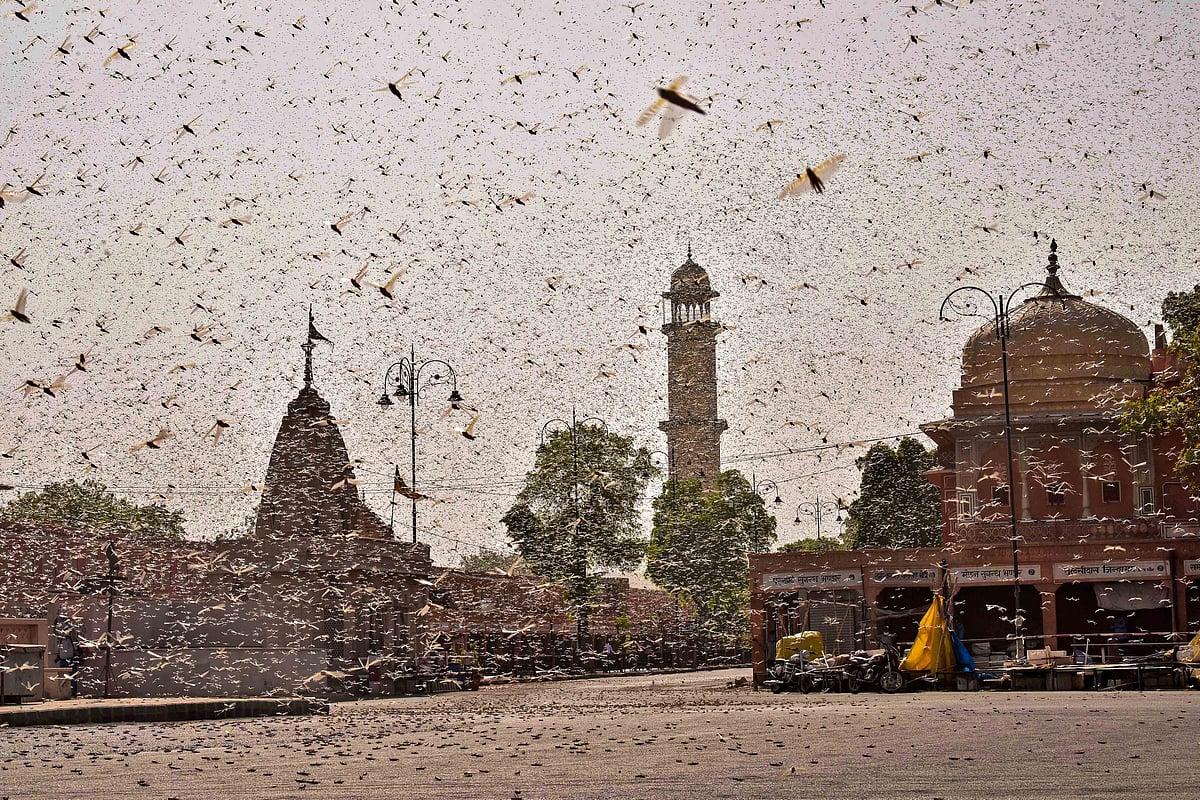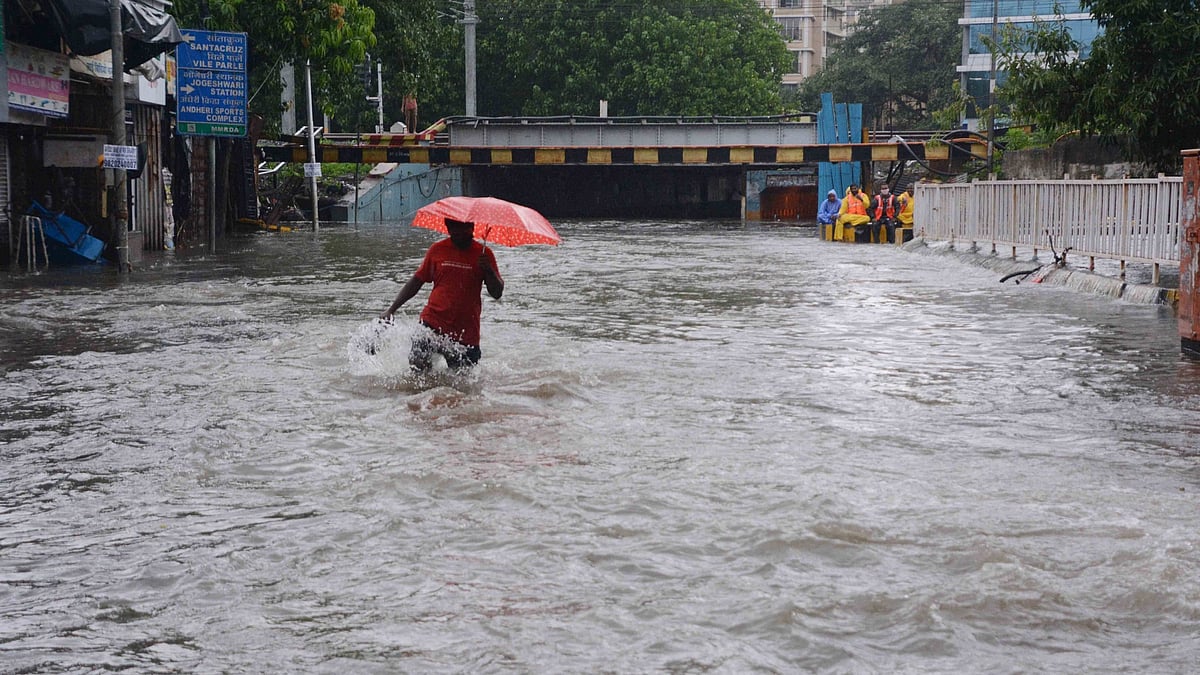As the country deals with the coronavirus pandemic, several states across India have witnessed locust attacks in the last few days. States like Rajasthan, Madhya Pradesh, Uttar Pradesh, and Maharashtra have been adversely affected by the locust attack.
Locust belongs to the family of grasshoppers. These insects form enormous swarms that spread across regions, devouring crops and leaving serious agricultural damage in their wake. These insects are normally harmless, their numbers are low and do not pose a major economic threat to agriculture. However, under suitable conditions, like rapid vegetation growth, serotonin in their brains triggers a dramatic set of changes: they start to breed abundantly, becoming gregarious.
With their population becoming denser, they form swarms and keep moving across areas damaging the crops. These swarms attacking crops and devastating agricultural economy is what is commonly referred to as locust plague.
So what are these states doing in order to tackle another crisis? Here's all you need to know:
Maharashtra
A swarm of desert locusts has entered the eastern part of Maharashtra where district and agriculture department personnel have initiated chemical spraying on crops and vegetation to save them from the migratory pests, said officials on Monday.

Primary reports indicated that in the last couple of days, four to five villages in the Vidarbha region have come under attack from the locusts, known for feasting on all sorts of plants and standing crops.
Joint director of agriculture Ravindra Bhosale told PTI, The swarm of desert locusts entered the state from Amravati district. It then went to Wardha and now it is in Nagpurs Katol tehsil."
A team from the regional centre of the Central Integrated Pest Management Centre has started spraying chemicals on crops and plants near the Jalalkheda bypass where the insects have been located, he said.
"Central agencies in this field had alerted us about the locust attack and necessary information had been passed on to villagers as well," Bhosale said.
"A swarm does not travel in the night. The migratory pests travel during the day time and fly as per the wind direction," the officer said.
"Locusts are very dangerous to all types of vegetation. They feed on green leaves and known for devouring crops spread across on acres of land, he said.
I am personally monitoring the chemical spraying as we would using some 1,200 litres of water with insecticides, the official said.
Earlier, locust attacks were reported from neighbouring Gujarat and Madhya Pradesh.
According to the Food and Agriculture Organisation (FAO), an agency of the United Nations, the desert locust is considered the most dangerous of all migratory pest species in the world.
It threatens peoples livelihoods, food security, the environment and economic development, the FAO has said.
Rajasthan
Rajasthan has been reeling under the most widespread locust attack for the last three decades. Swarms of locusts coming into India from Pakistan have travelled hundreds of kilometres to spread across most parts of Rajasthan.

A man blows the Shankha to scare away the swarms of locusts sitting on the trees in the village in Jaipur on Monday | ANI
The locusts have also reached the districts of Madhya Pradesh and Gujarat. Efforts at containing the swarms are proving insufficient and difficult as the swarms have travelled with the winds to reach districts, traditionally not attacked by locust swarms.
Speaking to ‘The Free Press Journal’ BR Karwa, Additional Director Agriculture said, “Control measures are being adopted, but the locust swarms cannot be killed completely. Only about 50-70% are killed by the pesticide spray. Further, WHO norms about type of pesticides and concentration need to be followed for the spray. The recommended time is 2 am when the swarm has settled down.”
“This time the swarms have reached non traditional areas with tall trees and vegetation. It is quite different from the traditional attack areas in desert districts. There vegetation is sparse and close to ground so spraying is easy. Now we need spray machines mounted on tractors and even fire brigades to reach the trees where locusts are resting,” added Karwa.
Locust swarms have been coming from Pakistan for almost a year now. They have been defying their traditional behaviour pattern in terms of timing and duration of swarms attack, flying pattern and intensity. The swarms were present all through winter which is an unheard of phenomenon.
LS Rathore, former Director General Meteorological Dept said, “Locust swarms coming for almost a year is unnatural and mismanagement is a major reason for this sustained attack. Food and Agriculture Organisation (FAO) facilitates international collaboration to deal with such cross-border exigencies. There has been poor coordination to this end.”
It cannot be denied now that ground level efforts to eliminate the swarms will not prove to be enough. India will have to work in tandem with FAO and Pakistan to check these locust swarms.
Uttar Pradesh
The Uttar Pradesh government Monday announced a state-wide alert after an army of locusts invaded farms in several districts. Locust is a pest which destroys crops and vegetation.

Swarm of locusts attacks Rajasthan, Maharashtra, MP, and UP: How these states are tackling another crisis amid the pandemic |
Authorities fear that the pests have affected crops in 17 districts of the western UP including Agra, Aligarh, Bulandshahr, Etah, Kanpur and Mathura.
The district administrations have sounded the bugle and directed fire brigade to keep vehicles ready with chemicals to tackle the swarm of locusts. Besides, a team has come from Kota, Rajasthan to tackle the locusts.
“The swarm of locusts, which is moving in the state is small in size. We have got the news that nearly 2.5 to a 3-kilometre long swarm of locusts has entered the country,” said Deputy Director Agriculture Kamal Katiyar.
Mathura administration has formed a task force to deal with any potential locust attack in the district, an official said on Monday.
The task force was constituted to keep a strict vigil on any movement of locusts in the area, Mathura DM Sarvagya Ram Mishra said.
Chief Development Officer Nitin Gaur and officials from Agriculture department will be in the task force, he said.
The district magistrate said 200-litre Chloropyriphos has been kept as a reserve and its sellers in the area were advised not to supply the chemical outside the district.
He said over a dozen tractors mounted with sprayers were kept on standby and fire brigade department asked to remain alert.
On Monday, several areas in the district were under the locust attack, which continued on Tuesday too.
Andra Vamsi, Jhansi District Magistrate said, "Locust swarms have arrived in Jhansi from Rajasthan. It has been observed that their movement is more concentrated near the river bed, affecting vegetable and soya plantations."

The district administration had started spraying pesticides in fields from Sunday night and farmers started beating drums and clanging plates to make a noise since locusts are said to be afraid of noise.
The state government had already started an awareness campaign against possible locust attacks from May 15 in which pamphlets and hand bills were distributed to farmers on this issue.
The Locust Warning Organisation (LWO) of the Union ministry of agriculture and farmer welfare has warned of another attack in May-June.
Madhya Pradesh
Arrangements have also been made by villagers for making noise by beating 'thalis' and bursting crackers to make the locusts move on, Mishra said.
The farmers have been advised to plough their fields as the insect prefers breeding in sandy soil, the DM added.
Farmers in Budhni and Nasrullaganj areas of Madhya Pradesh's Sehore district have been beating utensils in a bid to drive away locusts that have attacked their farms.
Disinfectants are also being sprinkled on trees and crops to protect them from locusts in these areas.
"There is a possibility of great damage to the crops due to locusts. The Agriculture Department and administration is keeping an eye on the issue," said Jainendra Kumar Kanaujia, agriculture scientist.
He also urged the farmers to continue with such activities and not allow locusts to not damage the crops.
(With inputs from Agencies, Kanchan Srivastava and Sangeeta Pranvendra)




